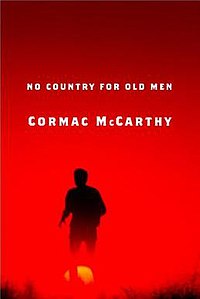I
enjoy stories with villians. A good villain is a fully developed
character and not just a background entity, not just an obscure presence
prompting the “good” characters onward. While Chigurh is obviously the
bad character, it is less clear if Llewelyn Moss is the good character.
The voice of peacekeeper, Sheriff Ed Tom Bell, is conflicted as well.
Llewelyn
finds the remains of a drug deal gone wrong. He grabs the cash and
makes a dash. Chigurh pursues relentlessly with the passion of a zealot
who believes in what he’s doing. Others give chase including the law and
the lawless. In the end, it is not money that drives the characters. It is principle and will.
McCarthy
has a way of exploring good and evil that is only possible by exploring
violence -- minds that are violent by nature and violent acts that lie
dormant in any average person and erupt given the right circumstances.
Chigurh is unusual because he is morally
demented as opposed to morally corrupt. He does not necessarily take
pleasure in violence but he is committed to violence nonetheless. He is
not altogether illogical either which is the scary part. His mind is
functioning properly. He is not “insane” in the sense that he lacks the
ability to reason. He has reasoned and found himself at odds with
traditional views of morality and the sacredness of life.
The
novel is sparse in language and, while I found it easier to read than
All the Pretty Horses or The Road, No Country for Old Men is less
linguistically beautiful. It is also significantly less violent than The
Road (which won the Pulitzer) and moves much faster than All the Pretty Horses. It’s a good middle-of-the-road McCarthy read so if you’re new
to his novels I would say start with No Country for Old Men and see if
you can handle forays into dark psyches and violent behaviors.
Publisher: Vintage, 2005. Pages 309
Rating: 3 Stars Source: used bookstore
